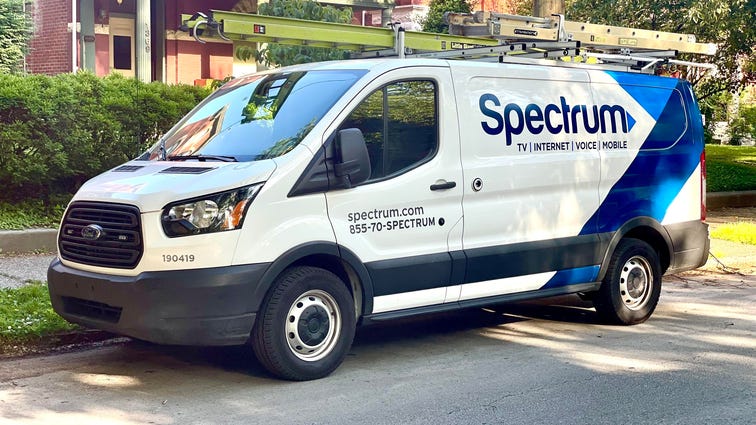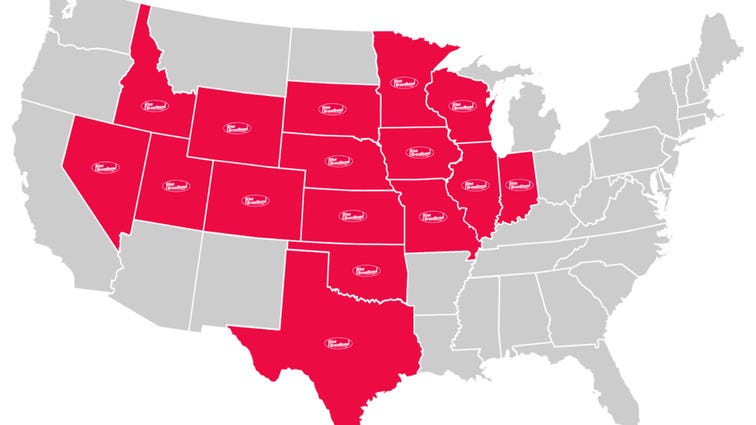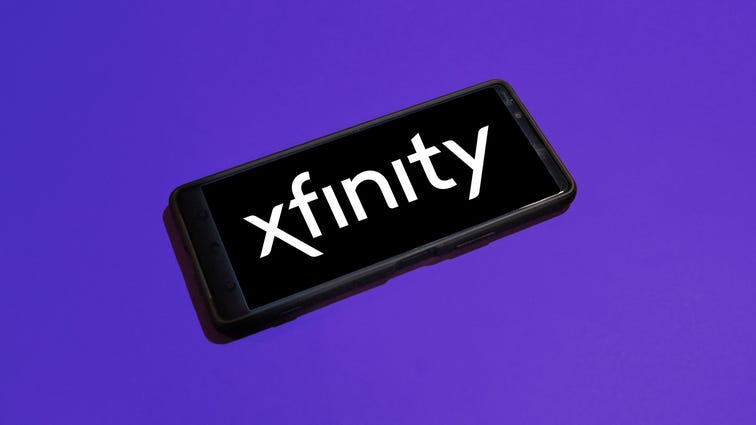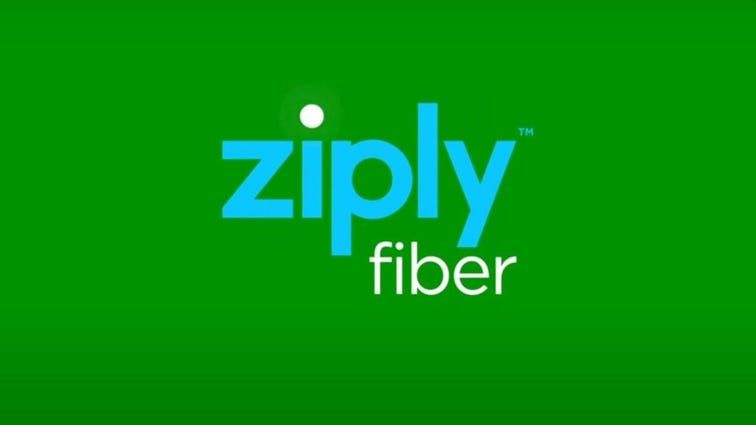How To Choose The Best Internet Service
A fast, reliable internet connection at home is borderline essential these days, peculiarly given the recent uptick in remote work, which seems to be sticking around even every bit coronavirus restrictions ease. That means it'due south more of import than e'er to sympathise whatever cyberspace options are available at your address -- and, ultimately, to pick the best provider for the job.
Finding the correct Isp can be easier said than done, though -- especially if you live in a rural office of the country with limited options for getting online. That'southward why we've spent months evaluating all of the top cyberspace providers in the U.s., from household names like Comcast and Verizon to little guys similar Ascent Broadband and WideOpenWest. Our goal is to sift through the sales pitches, speed claims and fine impress to put each provider into context, and to provide you with all of the information you need to choice out the plan that makes the most sense for your dwelling house.
To date, we've reviewed more than 20 ISPs, and yous tin look united states to continue covering the category throughout 2022. For at present, here are the top providers nosotros'd recommend first.

Saul Loeb/AFP/Getty Images
I of the metrics nosotros like to use to compare value between ISPs is the average cost per megabit per 2nd of download speed. A lower toll per Mbps is a skilful, rough indicator of value -- and with AT&T's cobweb cyberspace plans, the average toll per Mbps is just 10 cents, and that includes your equipment rental.
For comparison, you tin can expect the average fiber internet plan from Verizon to cost you lot 12 cents per Mbps, while a cobweb programme from CenturyLink volition cost you 16 cents per Mbps. Meanwhile, most cable net plans from names like Spectrum and Comcast Xfinity will typically cost y'all at least 25 cents per Mbps, if not more. One other signal that's worth mentioning: In 2022 AT&T began offering multi-gig plans with concurrent upload and download speeds of ii and 5 gigabits per second.
All of that is to say that AT&T's fiber plans are a terrific value -- especially since none of them come with any contracts or information caps. On top of that, AT&T was height-ranked for customer satisfaction in 2021 from both the American Customer Satisfaction Index and from J.D. Power. The telecom behemothic's DSL and fixed wireless plans are much less impressive, but if AT&T cobweb is available at your address, consider yourself lucky, because there really isn't much reason to consider anything else.
Read our AT&T review.
AT&T Dwelling house Internet

Ry Crist/CNET
You'll discover ameliorate bang for your cadet with fiber providers like AT&T, only if fiber isn't an pick, a cablevision connectedness is the next all-time affair. And, among all of the providers offering cable internet service in the country, Spectrum is the 1 I'd be happiest to see available at my address.
Spectrum isn't the biggest proper name in cablevision internet -- that'd exist Comcast Xfinity -- but information technology still offers service to more 100 one thousand thousand Americans, thanks to Lease's conquering of Time Warner'south cyberspace infrastructure in 2016. And, different Comcast (or Cox, its other main cablevision rival), Spectrum doesn't enforce a data cap, and information technology won't tie you downward to a long-term contract, either.
On superlative of all that, Spectrum's prices and terms are straightforward, easy to empathize and piece of cake to live with -- and the average Spectrum plan comes with a lower cost-per-Mbps than either Comcast or Cox. Information technology isn't quite the best value in the cable category (keep reading), but when you lot drill down into the details, Spectrum is however conspicuously your top choice for cable internet at domicile.
Read our Spectrum review.
Spectrum Net

Rise Broadband
Pickings tin can be frustratingly slim when yous're shopping for an internet plan in a rural area, because well-nigh of the all-time internet infrastructure in the country is centralized in population-dumbo cities and the suburban neighborhoods that surround them. If you live outside of a region like that, then your home probably isn't wired for fiber or cable -- instead, you'll accept to make exercise with technologies that are slower, less reliable and more expensive, and you'll likely have fewer options to choose from, too.
You lot'll need to have the expert with the bad with just nearly any rural ISP, but at that place'south more good than bad with Rise Broadband, our top pick for getting online when faster cable and fiber plans aren't an option. A stock-still wireless provider roofing much of the heart of the country, Rise Broadband will beam an cyberspace signal directly to an antenna mounted outside your abode, providing download speeds of up to 50Mbps. That's twice equally fast every bit what y'all'll get with a satellite net program from HughesNet, and faster than a lot of DSL plans, which oftentimes struggle to surpass double-digit download speeds.
Ascension's 250GB data cap is also significantly college than you'll get with nearly rural internet plans, and plans with unlimited information volition only cost you an extra $x or $20 per month, depending on whether y'all've signed up for speeds of 25 or 50Mbps.
Read our Rise Broadband review.
Read more: All-time Internet Providers in Chicago

Jim Lane/Pedagogy Images/Universal Images Group/Getty Images
In 2021, AT&T pulled into a tie with Verizon atop the American Customer Satisfaction Index's rankings of internet providers -- but Verizon had already held that spot for years, and it's been one of the strongest finishers with J.D. Power for multiple years running, too.
What practise people like about Verizon? For starters, while the visitor's DSL service isn't anything special, the bulk of customers across the company'due south eight-land coverage map in the northeast have access to Verizon Fios cobweb service capable of gigabit speeds, besides every bit uploads that are merely equally fast as the downloads. Verizon plans don't come with contracts or data caps, either, and your price won't automatically go up after a year the way it will with almost other providers.
What'due south more, Verizon has already made headlines in 2022 past expanding the availability of its 5G Home Net service to approximately 900 cities. That's a promising development for consumers, given the glaring demand for improve internet options across the country.
Read our Verizon review.
Verizon Fios

WOW
WideOpenWest -- or WOW -- is a relatively small provider that offers services in just nine states, merely it earns the assertion point information technology likes to stick at the end of its branding by offering cable internet plans at some of the all-time prices you'll observe anywhere in the US. That includes an entry-level 100Mbps programme that starts at $20 per month ($40 per month after the first year), too every bit a high-speed gigabit program that starts at $65 per calendar month. Even after the toll of that plan jumps to $75 per month in year 2, that'due south still a cost per Mbps of just 8 cents, which is unheard of in the cable category.
In add-on to all of that, WOW doesn't enforce contracts or data caps with any of its plans, and it offers a 30-24-hour interval money-back guarantee when yous sign upwards, letting you cancel without penalty if it isn't the correct fit. All told, it's about equally strong every bit ISP sales pitches get -- I simply wish the footprint was a bit bigger.
Read our WOW review.
WOW! Net
Honorable mentions

Robert Alexander/Getty Images
CenturyLink offers DSL net plans beyond 37 states, but roughly one-half of the coverage map likewise has access to CenturyLink's fiber plans, branded equally Breakthrough Fiber. That "Breakthrough" chip is meaningless, but the plans themselves are a great deal -- $50 per month for matching upload and download speeds of 200Mbps (near 25 cents per Mbps), or $65 per month for a gigabit plan with matching speeds of 940Mbps (virtually 7 cents per Mbps, which is an even better value than you'll go with AT&T). At that place are no data caps or contracts with those plans, and those prices don't arbitrarily go up later on a year, either.
Meanwhile, CenturyLink's DSL speeds are much slower, and can vary profoundly from address to address, merely with a apartment charge per unit of $50 per calendar month, the pricing is pretty fair by DSL standards. Better still, the DSL plans come with a Price for Life guarantee, which locks that rate in for as long as y'all stay a customer. If nothing faster is available at your address, a plan similar that might exist worth considering -- but if CenturyLink offers fiber service in your area, signing up is a lot closer to a no-brainer.
Read our CenturyLink review.
CenturyLink

Sarah Tew/CNET
Comcast is the biggest name in cable, and the company offers its Xfinity cyberspace service to well over 100 million people in the Usa -- more than than a tertiary of the country. Subscribers will find a cracking variety of plans and packages to choose from, including plans with download speeds of up to 1,200Mbps that are available across the majority of the sprawling coverage map (or, if they're lucky, plans with multi-gig speeds of up to 3Gbps that are available at a small pct of addresses). In addition, Comcast Xfinity consistently earns above-average customer satisfaction scores from organizations like J.D. Power and the American Customer Satisfaction Index.
That said, biggest doesn't mean all-time. Cable internet plans from Spectrum, WOW and Optimum all come at a slightly ameliorate value than most Comcast plans, and none of those iii enforce a data cap. Comcast does, capping your monthly data usage at 1.2TB, with penalties levied if you exceed it in a given calendar month. If you can alive with that, then there's a lot to similar about Xfinity home cyberspace -- but information technology'southward more of an honorable mention than an outright best pick.
Read our Comcast Xfinity review.
Xfinity Net

It'southward been over a decade since Google kickoff announced that it would bring fiber internet service to select regions across the country -- and it's been a bumpy ride ever since. After initially rolling out across 11 metro areas, Google struggled to build out the service beyond that and paused its efforts outright in 2016, leaving disappointment across dozens of cities where the company had teased prospects for future fiber expansions.
Google hasn't given up, though -- the company is currently working to expand fiber access in select cities, and recently rolled out plans that support speeds of up to two gigabits per second for $100 per month, available in Atlanta, Austin, Huntsville, Nashville, Orangish County, Provo and Raleigh/Durham. If y'all live in whatever of those cities, and Google Fiber is available at your address, give it a expect, because that's ane of the best deals yous'll find for such a blazing fast connection.
Read our Google Cobweb review.

Al Drago/Bloomberg/Getty Images
Satellite net is typically tiresome, laggy and temperamental in inclement weather, so I'd explore any and all other options if you've got them. But that's the matter -- too many of u.s.a. don't accept other options, and satellite cyberspace from established names similar Viasat and HughesNet is available just about everywhere.
If it comes down to those two, I'd start with Viasat. Why? Neither 1 offers strong value for what you're getting, but Hughesnet caps the max download speed of all plans at 25Mbps, which is the barest definition of broadband. With Viasat, satellite speeds of upwards to 100Mbps are available in some regions, and speeds are fix to ameliorate in 2022 with the launch of Viasat'southward newest satellite hardware. Viasat besides offers information caps that are slightly higher than what you lot'll get with HughesNet.
All of that said, there are aspects of Viasat's service that would probably be more than at dwelling on a worst list than a best list like this. For starters, your monthly bill will shoot upward after merely iii months -- and with some plans, the increase is a whopping $50. You lot'll besides need to concord to a two-year contract, with potentially steep penalties if you decide to cancel early. Like I said, brand certain to shop effectually for other, meliorate options in your area -- just if there aren't whatsoever (and if you can breadbasket the heaven-high prices), Viasat is a workable pick for getting online in remote parts of the country.
Read our Viasat review.
Viasat

Ziply Fiber
Ziply is a relative newcomer to the cobweb scene later acquiring fiber-optic infrastructure in the Pacific Northwest from Frontier. The service launched terminal year amongst the pandemic, offering relatively affordable fiber plans to customers across parts of Idaho, Montana, Oregon and Washington.
Plans are express for at present, with a notable lack of eye-footing options in between the 100 and 1,000Mbps speed tiers, but Ziply offers strong value and reasonable terms, and it doesn't enforce information caps, contracts or credit checks for any of its plans. It also recently began offering multi-gig speeds of 2 and v gigabits per second, admitting limited to merely 170,000 households beyond the footprint at launch in 2022.
Ziply is also currently including whole-home Wi-Fi with up to three extenders in its $x modem rental fee, which is a nice deal for anyone interested in trying out the benefits of a mesh network. We'll keep an middle on the company every bit information technology grows, just we like what nosotros're seeing so far.
Read our Ziply Cobweb review.
Other providers we've reviewed
The broadband beat keeps our team busy, but nosotros'll go on evaluating internet providers and updating this post every bit new options emerge. For now, hither's a rundown of every other provider nosotros've covered, with a link back to our full review and a quick summary of our thoughts.
Armstrong Net : Based in Butler, Pennsylvania, Armstrong is a regional cable net provider servicing customers in 6 states. Prices are a impact higher than you'll meet from larger cable providers, and some plans come with data caps, but speeds are reasonably fast and your equipment comes included, which helps ease the sting from your bill. Information technology's worth a look at addresses where faster fiber connections aren't available nevertheless.
Astound Broadband : The recently rebranded service from cable mainstay RCN doesn't enforce contracts or data caps, only the painfully steep increases in your monthly rate afterwards year one make it tough to recommend outright. Customers in some regions will see their monthly pecker go upwards by more $100 after the first 12 months.
Cox : Cox offers gigabit cable download speeds across its entire coverage map, and while it also enforces a data cap, its policies around that cap are friendlier to consumers than yous might wait. Still, the prices skew college than other cable providers like Xfinity and Spectrum, and nosotros're not crazy about the fact Cox gateways double as public-facing hotspots that strangers can connect through unless you opt out.
Earthlink : One of the oldest names on this listing, Earthlink leverages the DSL and fiber optic infrastructure of other providers in lodge to offering internet plans nationwide. Prices are higher than average, though, but give the visitor credit for transparent terms, and for eschewing information caps and throttling altogether.
Borderland : One of the nation's largest providers, Frontier offers home cyberspace service via both cobweb and DSL. With no excessive fees or data caps, information technology's a decent selection for rural cyberspace, particularly if fiber is bachelor at your address. That said, the visitor'due south not-transparency with pricing and speeds have earned it a spotty track record with client satisfaction, so continue an eye on your beak later on year one.
HughesNet : Like its main satellite cyberspace rival Viasat, HughesNet is available just about anywhere, and speeds are more consequent across its coverage map, besides. All the same, with high equipment costs and downloads that don't become any faster than 25Mbps, it's more of a last resort option than anything else.
Mediacom : Mediacom's cable internet service offers gigabit download speeds across the nearly-entirety of its coverage map, but most plans will run across cost increases afterward both the commencement and 2d yr of service, which is a tough pill to swallow. On top of that, the information caps are especially tight, and there's no limit to the number of overage charges you can rack up each calendar month.
Metronet : The land's largest, independently endemic fiber-optic internet provider, Indiana-based Metronet recently merged with Texas-based Vexus Cobweb, a move that expands the visitor's footprint across 15 states. Its commitment to maintaining a 100% fiber-optic network and the lack of contracts, data caps or equipment fees get in a provider worth paying attending to and potentially signing up for, but pricing is middle-of-the-road compared with other fiber providers.
Nomad Internet : Launched in 2017, Nomad leases 4G LTE airwaves from larger carriers to provide connectivity for rural areas and for people on the go, including business travelers and RV enthusiasts. The lack of contracts or cancellation fees is an appealing part of the sales pitch in spite of some high upfront costs, but your speeds will vary greatly, every bit those larger carriers will always reserve the right to serve their own customers first.
Optimum : Available in New York and select surrounding regions, Optimum offers fast speeds, low introductory pricing and no data caps or contracts whatsoever. It'southward an option worth considering, simply be aware that nearly plans feature upload speeds that are lower than they should exist, and that the company'southward customer satisfaction scores accept been trending in the wrong direction in contempo years.
Sparklight : With a hybrid network that mixes cobweb and cablevision infrastructure, Sparklight offers customers in select parts of 21 states reasonably fast speeds on transparent terms, and the company deserves credit for extending faster connections to parts of the country where DSL and satellite might be the but other options. Tight data caps are a disappointment, though, peculiarly on the lower-priced plans, where your monthly rate volition as well go up after just three months.
Starry Internet : Similar to 5G providers, Starry uses millimeter moving ridge technology for its fixed wireless home internet service. At that place's a lot to like about the company's delivery to consumer-friendly terms, with no contracts, data caps or capricious price hikes, and speeds of upwardly to 1Gbps are bachelor in select parts of the still-growing coverage map. We'll continue monitoring the company'south progress throughout 2022.
Suddenlink : A sister brand to Optimum nether parent visitor Altice, Suddenlink offers appealing promo rates, it doesn't enforce information caps, and it's actively working to expand its footprint, with 80% of customers already eligible for gigabit service. All of that is good, but the steep price increase after year i and a recent decline in customer satisfaction ratings are both points of concern.
Starlink : Billionaire Elon Musk'south effort to disrupt the satellite cyberspace category, Starlink is an offshoot of SpaceX, and it'southward actively leveraging SpaceX launch capabilities to deploy an ever-growing constellation of satellites in low-world orbit. Lower satellites means a faster connectedness with less latency, and that'south what Starlink offers, but the service yet isn't bachelor to every bit many addresses and regions as Hughesnet or Viasat, and the cost of buying in is steep, fifty-fifty by satellite standards.
T-Mobile : The mobile carrier began rolling out domicile cyberspace service via 5G and LTE in early on 2021 -- now, in 2022, it's available to more than than 30 million households in xl states. With a apartment monthly charge per unit of $50, download speeds varying from 35 to 115Mbps, and no contracts, information caps or preset price increases, it's one of the more intriguing options in abode internet right now, peculiarly as 5G connectivity continues to improve.
Windstream : Kinetic, Windstream'southward home cyberspace service, offers relatively fast speeds in rural parts of the country, and prices are typically pretty reasonable, too. It's worth a look beyond many parts of its coverage map, but exist aware that pricing will vary from region to region, making it difficult to recommend outright.
Best internet provider FAQs
What's the cheapest way to get cyberspace?
That depends. We know, non helpful, but stay with us.
One of the cheapest ways to become internet service right now is through the government's Affordable Connectivity Program. Information technology'due south a long-term subsidy set to help qualifying households receive $30 per month ($75 for those on Tribal lands) towards cyberspace service. In that location are as well other permanent programs bachelor for low-income families, every bit well as for seniors and students.
Lastly, y'all can try negotiating with your current cyberspace provider to secure a lower rate on your broadband service. Or y'all can keep your optics open for broadband deals or other net promotions offered each month.
Who'south the fastest internet service provider correct now?
The good news is it's now common to find gigabit plans offered by almost all major ISPs. But, as nosotros often say, the fastest internet service for you volition depend on your location and specific address. Of the major providers, Xfinity often extends the fastest plans bachelor for residential homes, with 1,200Mbps equally its gigabit offering (versus the typical 940Mbps well-nigh providers offering) and it likewise boasts a 3,000Mbps "Gigabit Pro" plan, merely that's not equally widely available and requires a site survey to ensure serviceability.
Just this January, Ziply Fiber appear that information technology'southward rolling out ii- and v-gig plans to approximately 170,000 homes in the Northwest. Not to be outdone, a week afterward AT&T unveiled its new multi-gig tiers, which are at present available in over seventy cities across the country. Suffice to say that this speed race between providers is only only beginning.
What internet speed do I need?
The Federal Communications Commission defines "broadband speed" as a minimum of 25Mbps download and 3Mbps upload speed. Only that definition is out of engagement. Every bit mentioned to a higher place, most providers at present offer a gigabit programme, only well-nigh households won't need that much speed. According to a 2021 report from OpenVault (PDF), the boilerplate American household is using 231Mbps download speeds (though virtually 70% of households get less than 200Mbps) and 17Mbps upload. Does that mean you'll need that much? Not necessarily. The net speed yous need will be dependent on how many people are using the net in your abode and for what activities yous demand it.
How To Choose The Best Internet Service,
Source: https://www.cnet.com/home/internet/best-internet-providers/
Posted by: pindermorephal.blogspot.com


0 Response to "How To Choose The Best Internet Service"
Post a Comment